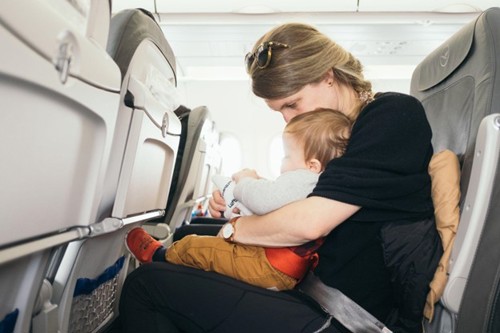When is the earliest a baby can fly?

There’s a lot to think about when you’re a new parent, especially when it comes to travel. From ensuring your ‘baby bag’ is well stocked before leaving the house to making sure the car seat is properly fitted, preparation is the key to family travel. However, if you’re planning a first trip abroad with a newborn, you might be wondering at what age your baby can travel on a plane with you.
In this blog, we take a look at the official rules and the accepted professional advice when it comes to flying with a newborn. We will also provide you with our top tips that all new parents need to know before travelling with their baby on a plane.
How old does a baby have to be to fly?
In theory, babies can fly just a few days after being born. However, experts do not recommend it. This is because the baby's young immune system may not be able to cope with illness and infection, and therefore travelling before they've had their primary vaccinations can be risky. According to advice provided by the NHS, it’s best to wait until your baby is over two weeks old before taking them on a plane.
It’s also worth noting that most airlines have their own policy when it comes to the age limits of their passengers. As we mention above, typically infants need to be at least two weeks old before they can travel. However, some airlines allow seven-day-old babies on board. That being said, these booking policies differ from airline to airline. Some companies may also ask you to provide a fit-to-fly letter for your baby, written by your doctor, if they are under a certain age. For this reason, it’s important to check directly with your chosen airline before booking a flight.
Is it safe for babies to travel by plane?
The simple answer is yes. As a rule, air travel is completely safe for the vast majority of healthy infants. But before deciding to fly, as a parent you need to think about your baby’s health. While air travel is perfectly safe for healthy, full-term infants, if your baby was born premature or, for example, has been diagnosed with respiratory or other health issues, flying before the age of one carries more risks.
Although only representing a slightly increased risk when compared to being in an enclosed public space on the ground, the transmission of airborne illnesses is greater on an aeroplane. As newborns (and especially those with existing health conditions) do not always have fully functioning immune systems during the early months of their lives, their risk of catching an infectious disease is naturally greater than older infants.
If you are unsure whether it is safe to take your newborn child on a plane, speak to your GP. They will be able to provide advice with your child’s health record in mind, helping you to make an informed decision.
Travelling with a baby on a plane: things to consider
Aside from your baby’s ability to fight airborne germs and illnesses, there are also a few other factors all parents should consider before booking a flight. Below we run through these factors, helping you to prepare for all eventualities and providing our top tips.
- Navigating the airport
The only thing more stressful than having to rush through an airport to make a flight is having to do this with a small child. For this reason, organisation is paramount when it comes to travelling with little ones. To help you feel as calm and in control as possible, arrive at the airport with plenty of time to spare.
To make this dreaded aspect of your journey easier, consider booking some travel extras. For example, you can take advantage of Fast Track Family Parking. This service allows you to pull up in an extra wide parking bay just a short walk from the terminal entrance. To make your journey even easier, this service also comes with complimentary Fast Track Security passes for up to two adults and two children. With these, you and your family can skip the regular airport security queues, spending less time in security. When you have a newborn with you, these little bonuses can make all the difference!
- Cabin pressure and ears
When you’re actually on the plane and taking off, one thing to consider is your baby’s ears popping due to cabin pressurisation. During both ascent and descent, this process can create intense pain in your infant’s ears, causing them to cry. This can be soothed and, in some cases prevented altogether, by having your baby suck on a dummy or bottle during take off and landing.
- Fussy behaviour
With so many unfamiliar sounds, sights and smells in the cabin of an aeroplane, not to mention the aforementioned potential for ear pain, babies screaming, crying, and being generally fussy is commonplace. Make sure you’re as prepared as possible to soothe your child. This could involve simply allowing them to suck on a bottle or dummy and distracting them with toys. Alternatively, you could try to schedule your baby’s nap time for when you are boarding. Soft ear plugs can even be purchased to help dull the noise of take off, helping your child sleep.
- Changing nappies
While the vast majority of commercial planes now have pull-down changing tables in the onboard toilets, some smaller planes may not. On top of this, during take off, landing, and times of turbulence, you will not be able to leave your seat to take your child to the restroom. With this in mind, if possible, change your baby just before boarding and remember to bring a spare change of baby clothes and extra nappies in your hand luggage.